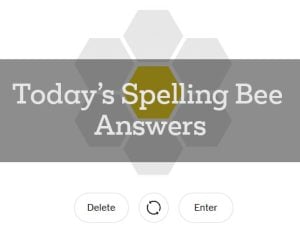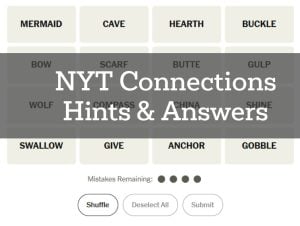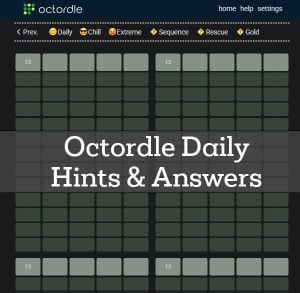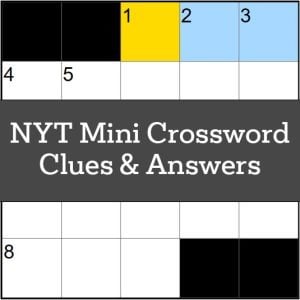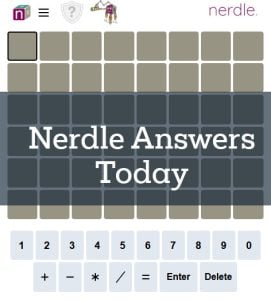Looking for the answers and hints for the Quordle puzzle from June 16, 2025? You’ve come to the right place! Every day, we archive the solutions to help you check your work or get that final clue you need. Below you will find all the answers for yesterday’s Quordle challenge.
Quordle Hints for June 16, 2025
Here are all the official hints to guide you toward the solution.
Word 1 Hints:- The first and last letter are consonants, with the third letter being the same as the first, all surrounding a single vowel in the second position.
- This word is both a noun and a verb, often used to describe a sudden and intense reaction or action.
- It’s related to electricity and can also refer to an unexpected or distressing event.
- You might experience this when you touch a metal object after walking across a carpeted floor on a dry day, or when you hear startling news.
- Imagine feeling a sudden jolt or surprise, perhaps even causing you to jump or feel alarmed momentarily.
- The structure of this word consists of five letters and only includes one vowel, which is not at the beginning or the end of the word.
- This word is a noun, and it often refers to a physical object rather than an abstract concept.
- The object associated with this word is commonly found in the context of beverages, particularly those linked to German culture.
- You might typically see this object in use during a festive gathering where people are celebrating with hearty toasts and perhaps wearing traditional clothes.
- If contemplating a vessel with a handle that's particularly associated with Oktoberfest, you're likely homing in on the right object.
- The word has one vowel repeated and three consonants, all in a 2-1-1 pattern.
- This term is a verb, typically describing a particular type of cooking method.
- It belongs to the culinary realm, particularly related to the application of high-heat.
- You might perform this action to prepare a succulent piece of steak or toast your bread in the morning.
- This verb is what you do to food when you want a charred or crispy exterior without the use of a grill.
- The word has a consonant to kick things off, followed by a vowel, another consonant, then repeated vowel and it ends with a consonant.
- This is a noun that usually denotes a group rather than a single entity.
- Rooted in mystical and possibly archaic traditions, this term evokes images of rituals and secrecy.
- You might find this term used in literature or media that deals with witchcraft, fantasy, or historical accounts of sorcery.
- It's a gathering that wouldn't be out of place in a story about witches or arcane gatherings, particularly when discussing those who might mix potions or cast spells.
Spoiler Warning!
The final answers are below. Stop scrolling now if you want to solve it yourself!
Quordle Answer for June 16, 2025
Here is the final, official answer for the Quordle puzzle that was released on June 16, 2025.
SHOCK is a noun that refers to a sudden and often negative emotional or physiological reaction to an unexpected event or experience. An example of usage would be: "The news of the accident caused everyone present a great shock." The etymology of this word can be traced back to the Middle French 'choc', meaning "to collide", which came from the Old French 'choquier' which meant "to crash, clash". Players may have found "SHOCK" challenging due to the commonality of the starting letters 'SH' in English, which can initially lead to multiple word possibilities, as well as the word being associated with both physical and emotional responses, which might not come immediately to mind.
Word #2: STEINThe word STEIN is a noun that usually refers to a beer mug, typically made of stoneware and often featuring a hinged lid. One might say: "He collected antique steins from Germany." "STEIN" comes from the German word "Steinzeugkrug", which means stoneware jug. "Stein" in German simply means "stone", indicating the material originally used to make the mug. The challenge in "STEIN" for players might be due to its specific cultural context and the fact that it could be easily confused with more common words starting with 'ST', such as 'stain' or 'stein'.
Word #3: BROILAs a verb, BROIL means to cook by direct exposure to heat or to be subjected to intense heat. In the kitchen, you might hear: "For dinner, I'll broil a chicken breast." The word "BROIL" is derived from the Old French "bruler", meaning "to burn", which reflects the method of cooking. Players may have struggled with "BROIL" because it shares common letters such as 'B', 'R', and 'L' with many English words, making guesses less straightforward. Also, "BROIL" as a cooking method may be less familiar to some, potentially adding to the difficulty.
Word #4: COVENA COVEN is a noun that typically describes a gathering of witches. It is often described in fiction and mythology, for example: "The witches in the story formed a coven to cast a powerful spell." The term is thought to have first appeared in Scotland in the 16th century, possibly deriving from 'cove', meaning "a gathering of men". It gained popularity during witch trials and entered broader English usage. "COVEN" may pose a challenge due to the 'V', which is a less common letter in English, and because some players might not be readily familiar with terms from mythology and the supernatural.
Read More Daily Game Answers
Check out the answers and hints for our other popular daily word games and puzzles.


